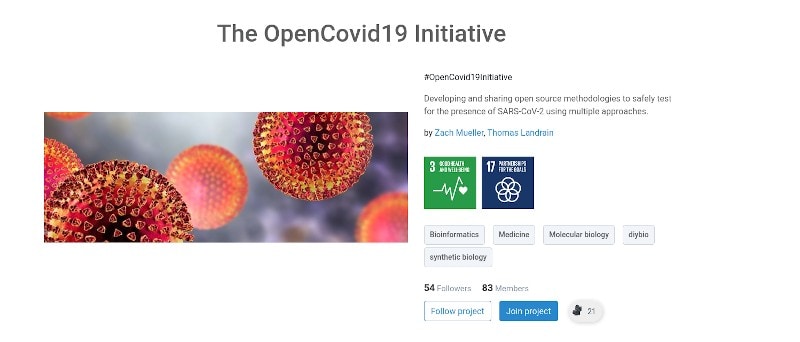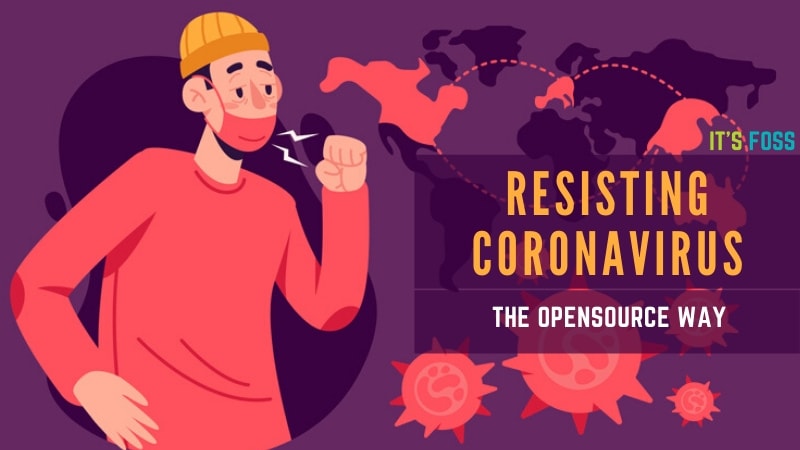Usually on It’s FOSS we talk about Linux and open source software with occasional open science stuff.
However, when we stumbled upon a post on Hackaday, we learned about an initiative (OpenCovid19) that tries to promote or develop open-source methodologies to safely test the Coronavirus (COVID-19) pandemic.
In other words, the initiative tries to potentially develop a community-driven procedure to safely test the presence of the virus.
It is worth noting that this initiative is mostly useful for medical professionals (or public responders) amidst the public health emergency situation around Coronavirus. Hence, we decided to cover this for awareness.
The OpenCovid19 Initiative

The OpenCovid19 initiative can be seen on Just One Giant Lab (JOGL) – which is a decentralized open research and innovation library based in Paris, France.
The OpenCovid19 facilitates collaboration opportunities for people with the relevant expertise to join and share insights to tackle Coronavirus.
In the initiative, they are focusing on developing open-source methodologies using tools that are as common as possible.
And, if you are someone with relevant knowledge, you can join the collaboration and access the compilation of notes that can help the process of COVID-19 testing.
They’re utilizing Slack, Google Docs, and Zoom to communicate with each other. And, if you take a look at their Lab notes, you will find a lot of details.
An Interesting Open-Source Collaboration

Technically, there’s not a lot of stuff here for an average netizen. However, for medical professionals, the community-driven approach is definitely an example of how the open-source community works in general.
We are not sure how helpful the initiative is – right now. It does have good potential to help people with the necessary knowledge to work together to develop open-source methodologies to fight against the Coronavirus outbreak.
Not just limited to open-source software, but the open-source approach could come in handy for a variety of real-world use-case such as this one.
It’s FOSS team member Avimanyu who is a Doctoral Researcher in the field of Bioinformatics recently went through the community call records of the project and found a wealth of information. One very interesting point to note about the project is that it devotedly follows open science principles. Why? Read on:
If you recall our first open science article, the third law of open science states that “There will be no patents”. This falls in line with the OpenCovid19 initiative. According to the first community call record, their knowledge gathering / research / literature review under the proposition of sub-objectives makes it clear that patents do not matter. People are suffering and dying, which is a matter of topmost priority.
Why should we care for patents if the virus itself is invented and patented in the first place? It involves the development of an attenuated (weakened) form of the coronavirus that could potentially be used as a vaccine to prevent respiratory diseases in birds and other animals. Even in a weakened form, it is still not alarm free. Extreme precautionary measures in such cases are of utmost importance. They could patent it but could not contain it? Nonetheless, the story doesn’t end there.
You can check out the first OpenCovid19 DIY interaction here. Note how people from different places across the globe are getting together and collaborating for such a noble cause:
Let me conclude by sharing some information about why more awareness is necessary as the pandemic is spreading at an alarming rate, especially in developing countries:
The following conclusion from a research paper (cited below) reminds all researchers and scientists about how responsibility matters:
In 1937, Max Theiler, the father of the yellow fever vaccine, wrote “One of the most striking phenomena to the student of virus diseases is the occurrence of variants.” [85]. Of course evolutionary biologists are equally fascinated by variants, and it is my hope that this review has shown how evolutionary biology and vaccinology have been intertwined since the inception of vaccination and how they must remain linked for vaccine design and deployment to proceed safely and effectively. The information and references herein may be useful for design of lectures or introduction to case studies that demonstrate the contributions of evolutionary biology to biomedical advances, including the generation of most of the virus vaccines in use today and creation of novel strategies for vaccine design. This review can also be used to emphasize the danger of ignoring evolution when deploying live-attenuated vaccine viruses, as, without due safeguards, evolution may reshape the virulence or transmissibility of these agents. Moreover virus vaccines themselves can and have influenced the evolution of naturally occurring viruses; the consequences of vaccination as a force of selection will continue to unfold as new vaccines are created and old vaccines become available to a larger proportion of the global population.
Hanley, K. (2011). The Double-Edged Sword: How Evolution Can Make or Break a Live-Attenuated Virus Vaccine. Evolution: Education And Outreach, 4(4), 635-643. DOI: 10.1007/s12052-011-0365-y
What do you think about the OpenCovid19 initiative? Let us know your thoughts in the comments below.
The article has been written by Ankush Das and Avimanyu Bandyopadhyay.


